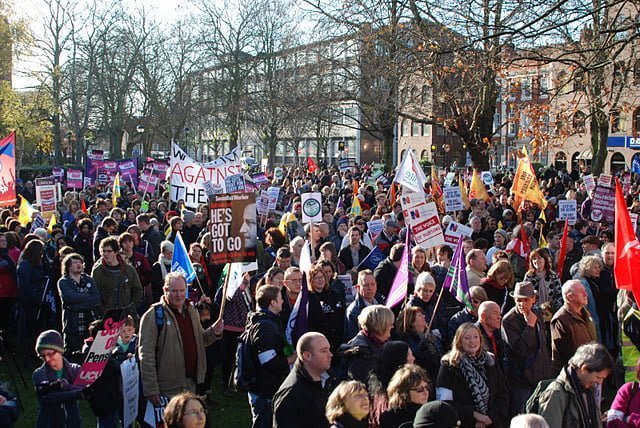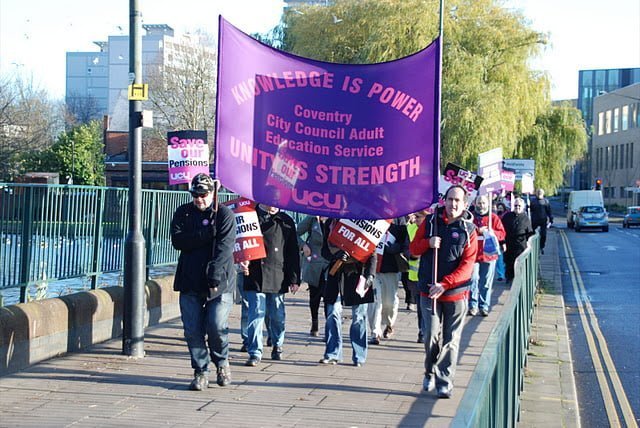On
the day it turned out to be the biggest trade union demonstration in
Coventry since the 1970s. They came in their hundreds from all parts of
the city and from all public sector trade unions as well as from trade
unions that were not on strike that day – the FBU was well represented.
By the time of the rally at the end of the march through Coventry city
centre some 2,500 trade unionists and their families were crammed into
the area known as Speakers Corner opposite the Council building.
Coventry on N30. The Biggest Trade Union March since the 1970s.
On
the day it turned out to be the biggest trade union demonstration in
Coventry since the 1970s. They came in their hundreds from all parts of
the city and from all public sector trade unions as well as from trade
unions that were not on strike that day – the FBU was well represented.
By the time of the rally at the end of the march through Coventry city
centre some 2,500 trade unionists and their families were crammed into
the area known as Speakers Corner opposite the Council building
To
ensure that the day itself would run as smoothly as possible, weeks of
careful preparation had taken place. The first meeting of the loosely
formed joint public sector trade union coordinating committee – Unison,
Unite, NUT, PCS and UCU – took place on October 19th. Up to November
28th, five separate meetings took place where we meticulously planned a
whole number of steps for us to take to ensure as massive a turnout as
possible on the day.
In the week leading up to N30 we had a full
page advert in the local free paper paid for by nine trade unions. It
called on trade unionists and the people of Coventry to turn out on the
day. We also planned careful stewarding of the march since to have had
road closures would have cost thousands of pounds. On the eve of the
march we had a meeting of about 40 trade unionists, many of them shop
stewards, who would act as march stewards on the day and keep good order
as well as protect the marchers at potential danger spots. A risk
assessment of the route had taken place and stewarding guidelines
produced. There were also rumours of a possible EDL interruption so we
were well prepared.
On the day itself the assembly point was the
steps of Coventry Cathedral. Many gathered there but trade unions also
had their own assembly points from where they marched in as feeder
marches. Unite gathered outside Transport House in Short Street; Unison
in the square in front of the Belgrade Theatre; PCS outside Sherbourne
House off Friars Road and UCU from the entrance to City College Coventry
in Hillfields. Most of those on the feeder marches had been picketing
workplaces since the early hours.
Just before 11am we set off from
the Cathedral and wound our way around the city centre to the rally
point. We had planned for there to be trade union speakers each of whom
would speak for a maximum of three minutes in order for there to be a
shortish and brisk rally to enable many to go off to Birmingham
afterwards for the rally there. In the end, however, a mixture of
enthusiasm, nerves and anger resulted in speeches going on for longer
than planned.
However, the crowd stayed and listened and clapped
and cheered with the biggest cheers reserved for any mention of the
banks and bankers being at fault and the need to take action against
them. This chimed with the reception given in the Birmingham rally to
the comments made by Brendan Barber of the TUC when he laid the fault of
the crisis at the door of the bankers and their practices.
 Not
Not
only in Coventry but all over the country some two million trade
unionists turned out in response to the strike call of their unions
after democratic balloting in favour of strike action. What a difference
it makes when the official labour and trade union movement lifts its
little finger. Members responded and others who were not previously
unionised took the step of joining. In my union, UCU, some 2,500 new
members joined in the weeks leading up to the strike.
The other
notable feature of the marches and rallies was the fantastic reception
given by the public on the routes. Most of them stopped and cheered and
gladly took leaflets from the various trade unions that explained the
reasons for the strike action. Very rare were the negative comments or
boos. This augers well for the future as the government propaganda
machine led by the BBC tries to drive a wedge between workers taking
action to defend ALL pensions and workers in other sections of the
economy.
The drivel from the BBC in the days leading up to the
action was despicable. If any of the newscasters are trade union
members, their own unions should take action against them. We were told
that the day’s strike would lead to half a billion pound in lost
production. Yet no mention was made of the minimum £10bn loss of
production from there being more than one million young people on the
dole. In a democratically planned economy, with the main means of
production socially owned, the 2.63 million idling on the dole would
find work and we could increase social wealth by at least £25bn in the
first year alone.
N30 is now over. It showed the potential power
that we have when we move in a united and determined manner. The main
question now is… what next? This mobilisation built on the UCU/NUS
national demonstration in London on N10 in 2010. We then moved on to the
magnificent TUC organised demo of March 26th 2011, followed by the smaller but more effective public sector strikes of June 30th. Where to now?
Can
we learn something from our brothers and sisters in other countries in
Europe who are facing similar attacks? In Greece there have been at
least 16 general strikes and many others in Ireland, Spain, Portugal and
Italy. The result for Greece and Italy has been the imposition of
governments at the behest of the European Central Bank and the IMF
despite the democratic wishes of the peoples of these countries. When
the future of capitalism is at stake even so-called democracy is brushed
aside to reveal the naked rule of capital.
So what are the next
steps for us? Firstly, to build on the success of the local and regional
trade union links that have been formed between workers in the public
sector. Secondly, to extend these links to workers and their trade
unions in other sectors of the economy. Next, to work in and through the
labour and trade union movement to build the call for a national one
day general strike so that we as workers can feel the power of our
united voice. But finally, if all we do is march and demonstrate, then
we will not stop this government and its attacks on our jobs, wages,
pensions and conditions.
What they do is at the behest of capital,
of the rich and powerful, of the spivs and speculators in the banks and
finance houses. These political representatives of capital now in
government will do all possible to defend capitalism from itself. We in
turn can only defend our class, the working class, by advancing a
political programme that begins the process of putting an end to
capitalism and begins the transformation of society towards socialism.
That begins with the taking into public ownership of the banks and
building societies under democratic control, together with the main
monopolies which dominate our lives.
In that regard the failure of
the national leadership of the political wing of the labour movement,
the Labour Party, starting with Ed Miliband, to come out unequivocally
in favour of the national strike on N30 has to be condemned. Yet another
glorious opportunity missed to come out firmly on the side of working
people and their families, to defend them from the attacks of the Tories
and their henchmen in the Lib Dems. Contrast that lack of action with
LP elected representatives in Wales and Scotland as well as here in
Coventry where none of the Labour councillors crossed picket lines and
the leader of the Labour council spoke at the rally in support of the
strike.






